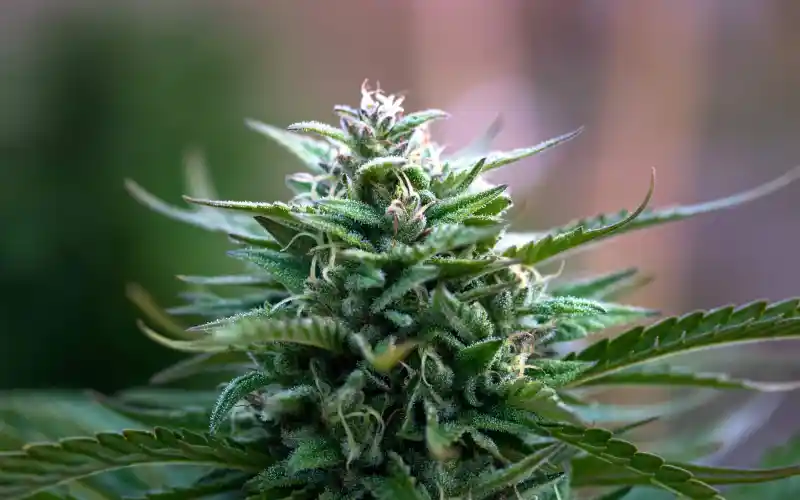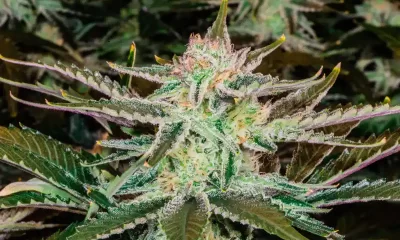Business
Minnesota-Based Native American Tribe To Begin Selling Recreational Cannabis After August 1

While Minnesota is still developing a dispensary license program for legal cannabis, the Red Lake Nation Tribe is getting a head start on sales.
In Minnesota, the Red Lake Nation council recently voted on July 11 to legalize adult-use cannabis starting on August 1. After that date, cannabis will be legal to purchase both for tribe and non-tribe members.
Legal recreational cannabis will become purchasable across Minnesota starting on August 1, although retail dispensaries will not be allowed to open for 12 to 18 months. First, state officials must create a regulatory foundation for dispensary licensing.
According to the Minnesota Reformer, the Red Lake Nation already has an operating medical cannabis dispensary, called NativeCare. After August 1, NativeCare will begin selling recreational cannabis, which puts the tribe in a unique position to benefit to become the state’s first recreational dispensary.
The only caveat is that the Red Lake Nation is located in the state’s Northern region. It’s about 30 minutes from Bemidji (south of Red Lake Nation), approximately three hours from Moorhead (on the western border) and Duluth (located on the eastern border), and four hours from the Twin Cities—aka Minneapolis and Saint Paul, the state’s two largest cities.
According to Red Lake Nation tribal secretary Sam Strong, selling legal cannabis offers many benefits for its tribal members. “We see this as a resource not only to reduce harm, but to also bring in resources to help our people recover,” Strong said in regard to cannabis’ ability to curb opioid addiction. Currently, the Red Lake Nation prohibits alcohol use on the reservation.
Strong also added that the tribe’s medical cannabis already meets state quality standards, including tests that verify it is free of contaminants. More information will be shared for cannabis consumers before the end of July.
On May 30, Minnesota Gov. Tim Walz signed legislation to make Minnesota the 23rd state to legalize recreational cannabis. “We’ve known for too long that prohibiting the use of cannabis hasn’t worked. By legalizing adult-use cannabis, we’re expanding our economy, creating jobs, and regulating the industry to keep Minnesotans safe,” Walz said at the bill signing ceremony. “Legalizing adult-use cannabis and expunging or resentencing cannabis convictions will strengthen communities. This is the right move for Minnesota.”
However, he cautioned that state officials will need some time to get things rolling. “We’ll be getting some people into the positions to be able to run this,” Walz continued. “But I assure Minnesotans that a lot of thought has gone into this. A lot of the things learned in other states are incorporated into how we do this, and the thoughtfulness around this legislation gives us a really good guiding principle.”
In June, Minnesota Gov. Tim Walz had announced that state tribes could get ahead with the pending cannabis legalization sales date. “I have toured the facility up in White Earth. It is a world class operation,” Walz said about the White Earth Nation tribe. “They have thought deeply about this.” According to the state’s recreational cannabis law, the governor can negotiate compacts with state tribes if they seek to take advantage of cannabis sales, but also “acknowledges the sovereign right of Minnesota Tribal governments” to regulate their cannabis industries even without a compact.
Early projections of Minnesota’s cannabis industry show that it could collect more than $1.5 billion per year by 2029, with more than 700,000 adult-use and medical cannabis patients in the state. Part of the newly passed recreational cannabis law allows low-dose hemp-derived THC beverages to be sold in liquor stores.
A handful of other Native American tribes across the U.S. that have embraced medical and/or recreational cannabis. In December 2020, the Saint Regis Mohawk Tribe in New York formed a partnership with MMJ BioPharma Cultivation with the intention of dedicating 20 acres of land to cannabis cultivation. In July 2021, the South Dakota-based Flandreau Santee Sioux Tribe was the first in the U.S. to legalize cannabis after the Department of Justice published a cannabis memo back in 2014.
Business
New Mexico cannabis operator fined, loses license for alleged BioTrack fraud

New Mexico regulators fined a cannabis operator nearly $300,000 and revoked its license after the company allegedly created fake reports in the state’s traceability software.
The New Mexico Cannabis Control Division (CCD) accused marijuana manufacturer and retailer Golden Roots of 11 violations, according to Albuquerque Business First.
Golden Roots operates the The Cannabis Revolution Dispensary.
The majority of the violations are related to the Albuquerque company’s improper use of BioTrack, which has been New Mexico’s track-and-trace vendor since 2015.
The CCD alleges Golden Roots reported marijuana production only two months after it had received its vertically integrated license, according to Albuquerque Business First.
Because cannabis takes longer than two months to be cultivated, the CCD was suspicious of the report.
After inspecting the company’s premises, the CCD alleged Golden Roots reported cultivation, transportation and sales in BioTrack but wasn’t able to provide officers who inspected the site evidence that the operator was cultivating cannabis.
In April, the CCD revoked Golden Roots’ license and issued a $10,000 fine, according to the news outlet.
The company requested a hearing, which the regulator scheduled for Sept. 1.
At the hearing, the CCD testified that the company’s dried-cannabis weights in BioTrack were suspicious because they didn’t seem to accurately reflect how much weight marijuana loses as it dries.
Company employees also poorly accounted for why they were making adjustments in the system of up to 24 pounds of cannabis, making comments such as “bad” or “mistake” in the software, Albuquerque Business First reported.
Golden Roots was fined $298,972.05 – the amount regulators allege the company made selling products that weren’t properly accounted for in BioTrack.
The CCD has been cracking down on cannabis operators accused of selling products procured from out-of-state or not grown legally:
- Regulators alleged in August that Albuquerque dispensary Sawmill Sweet Leaf sold out-of-state products and didn’t have a license for extraction.
- Paradise Exotics Distro lost its license in July after regulators alleged the company sold products made in California.
Golden Roots was the first alleged rulebreaker in New Mexico to be asked to pay a large fine.
Source: https://mjbizdaily.com/new-mexico-cannabis-operator-fined-loses-license-for-alleged-biotrack-fraud/
Business
Marijuana companies suing US attorney general in federal prohibition challenge

Four marijuana companies, including a multistate operator, have filed a lawsuit against U.S. Attorney General Merrick Garland in which they allege the federal MJ prohibition under the Controlled Substances Act is no longer constitutional.
According to the complaint, filed Thursday in U.S. District Court in Massachusetts, retailer Canna Provisions, Treevit delivery service CEO Gyasi Sellers, cultivator Wiseacre Farm and MSO Verano Holdings Corp. are all harmed by “the federal government’s unconstitutional ban on cultivating, manufacturing, distributing, or possessing intrastate marijuana.”
Verano is headquartered in Chicago but has operations in Massachusetts; the other three operators are based in Massachusetts.
The lawsuit seeks a ruling that the “Controlled Substances Act is unconstitutional as applied to the intrastate cultivation, manufacture, possession, and distribution of marijuana pursuant to state law.”
The companies want the case to go before the U.S. Supreme Court.
They hired prominent law firm Boies Schiller Flexner to represent them.
The New York-based firm’s principal is David Boies, whose former clients include Microsoft, former presidential candidate Al Gore and Elizabeth Holmes’ disgraced startup Theranos.
Similar challenges to the federal Controlled Substances Act (CSA) have failed.
One such challenge led to a landmark Supreme Court decision in 2005.
In Gonzalez vs. Raich, the highest court in the United States ruled in a 6-3 decision that the commerce clause of the U.S. Constitution gave Congress the power to outlaw marijuana federally, even though state laws allow the cultivation and sale of cannabis.
In the 18 years since that ruling, 23 states and the District of Columbia have legalized adult-use marijuana and the federal government has allowed a multibillion-dollar cannabis industry to thrive.
Since both Congress and the U.S. Department of Justice, currently headed by Garland, have declined to intervene in state-licensed marijuana markets, the key facts that led to the Supreme Court’s 2005 ruling “no longer apply,” Boies said in a statement Thursday.
“The Supreme Court has since made clear that the federal government lacks the authority to regulate purely intrastate commerce,” Boies said.
“Moreover, the facts on which those precedents are based are no longer true.”
Verano President Darren Weiss said in a statement the company is “prepared to bring this case all the way to the Supreme Court in order to align federal law with how Congress has acted for years.”
While the Biden administration’s push to reschedule marijuana would help solve marijuana operators’ federal tax woes, neither rescheduling nor modest Congressional reforms such as the SAFER Banking Act “solve the fundamental issue,” Weiss added.
“The application of the CSA to lawful state-run cannabis business is an unconstitutional overreach on state sovereignty that has led to decades of harm, failed businesses, lost jobs, and unsafe working conditions.”
Business
Alabama to make another attempt Dec. 1 to award medical cannabis licenses

Alabama regulators are targeting Dec. 1 to award the first batch of medical cannabis business licenses after the agency’s first two attempts were scrapped because of scoring errors and litigation.
The first licenses will be awarded to individual cultivators, delivery providers, processors, dispensaries and state testing labs, according to the Alabama Medical Cannabis Commission (AMCC).
Then, on Dec. 12, the AMCC will award licenses for vertically integrated operations, a designation set primarily for multistate operators.
Licenses are expected to be handed out 28 days after they have been awarded, so MMJ production could begin in early January, according to the Alabama Daily News.
That means MMJ products could be available for patients around early March, an AMCC spokesperson told the media outlet.
Regulators initially awarded 21 business licenses in June, only to void them after applicants alleged inconsistencies with how the applications were scored.
Then, in August, the state awarded 24 different licenses – 19 went to June recipients – only to reverse themselves again and scratch those licenses after spurned applicants filed lawsuits.
A state judge dismissed a lawsuit filed by Chicago-based MSO Verano Holdings Corp., but another lawsuit is pending.
Source: https://mjbizdaily.com/alabama-plans-to-award-medical-cannabis-licenses-dec-1/
-

 Business2 years ago
Business2 years agoPot Odor Does Not Justify Probable Cause for Vehicle Searches, Minnesota Court Affirms
-

 Business2 years ago
Business2 years agoNew Mexico cannabis operator fined, loses license for alleged BioTrack fraud
-

 Business2 years ago
Business2 years agoAlabama to make another attempt Dec. 1 to award medical cannabis licenses
-

 Business2 years ago
Business2 years agoWashington State Pays Out $9.4 Million in Refunds Relating to Drug Convictions
-

 Business2 years ago
Business2 years agoMarijuana companies suing US attorney general in federal prohibition challenge
-

 Business2 years ago
Business2 years agoLegal Marijuana Handed A Nothing Burger From NY State
-

 Business2 years ago
Business2 years agoCan Cannabis Help Seasonal Depression
-

 Blogs2 years ago
Blogs2 years agoCannabis Art Is Flourishing On Etsy











